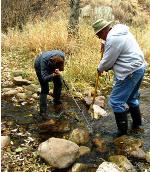A Tetra Tech analysis found that the Great Plains and the Southwest are at extreme risk for water sustainability.
Two New Bedford Harbor fishing piers will install marine power pedestals that will provide electricity to vessels, eliminating the need to idle diesel engines and thereby lower emissions of particulate matter and other gases.
Phil Whitford, aka Dr. Goose, offers expert advice to all - from homeowners and park districts to airports.
The $190,000 in grants will be used to further education and training for sustainable gardening, hazardous household waste disposal, carbon sequestration, and watershed protection.
The Ohio River Valley Water Sanitation Commission is responding to a gap in technology while the Kentucky Waterways Alliance voices its concern for the river.

Online learning module students demonstrated a 30 percent increase in content knowledge.
Projects across the region will preserve habitat, protect watersheds and spur responsible urban growth.
The biological nutrient removal wastewater treatment plan has been in operation for about two years.
New York City will implement the CASTion Ammonia Recovery Process to reduce nitrogen discharges in the bay.
A former landfill near South Lake Tahoe, Calif., is releasing volatile organic compounds into Saxon Creek and the county and the Forest Service will be monitoring area groundwater and considering possible solutions.
The U.S. Geological Survey has purchased $3.4 million of high tech electro-acoustic instruments from SonTek/YSI.

RS Hydro will install more than 250 flow monitoring stations for the cement supplier, using Siemens and Adcon technologies.
The revised regulation requires CAFOs that discharge to seek coverage under the National Pollutant Discharge Elimination System permit.
Covering 10 percent of a watershed with impervious cover can cause as much as one-third of a decline in pollution-sensitive aquatic insects.
Working for TVA, the lab is continuing its research to determine if selenium and other contaminants will have a long-term effect on fish populations.
The group's management process re-establishes the balance between plant growth and the behavior of herding animals.
In addition to penalties, the settlement requires ADOT and its contractors to implement a comprehensive stormwater quality training program for its employees.

Singapore International Water Week provides a platform for finding viable water solutions, which are critical for the sustainable growth of cities worldwide.
The Pesticides General Permit would require operators to use the lowest effective amount of pesticide, prevent leaks and spills, calibrate equipment and look for and report adverse incidents.